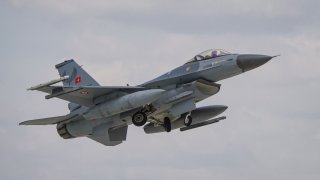Faced with the consequences of years of economic mismanagement, the keyword in Turkey now is détente.

Because of its recent equivocation about Sweden’s membership in NATO, doubt has arisen about Turkey’s commitment to the organization’s principles and aims.January’s paper by the International Working Group on Russian Sanctions confirms this doubt.
The group’s findings state that in the first ten months of 2023, there was only a ten percent decline in Russia’s import of battlefield goods compared to the pre-sanctions period. What is remarkable is that 95 percent of the parts found in Russian weapons on the battlefield are sourced from countries that had imposed the sanctions, with 72 percent accounted for by U.S.-based companies.
Most items in question reached Russia via third-country intermediaries, particularly China, Turkey, and the UAE.
Turkey’s position on this, as well as on a number of related issues, is also equivocal. On the one hand, it has condemned Russia’s invasion of Ukraine but also enjoys the benefits of thriving economic cooperation. Turkey has refused to join the international coalition that imposed sanctions and export control restrictions on Russia, which is a matter of concern for the United States.
A year ago, the U.S. Treasury’s Undersecretary Brian Nelson met with Turkey’s Banks Association and drew attention to the marked rise in non-essential Turkish exports or re-exports to Russia. Last November, he expressed concern over the six-fold increase in Turkey’s re-export of dual-use technology to Russia.
Consequently, in September, the Biden administration imposed sanctions on five Turkish companies and a Turkish national for supporting Moscow in its war against Ukraine.
Last month, the Treasury also sanctioned a procurement network, including a Turkish company, for facilitating the export of U.S. technology to Iran. In this context, an outstanding issue with Turkey remains the indictment of a Turkish state bank, Halkbank, for helping funnel more than $20 billion to Iran.
In October, after a terrorist attack in Ankara for which the PKK (Kurdistan Workers’ Party) claimed responsibility, Turkey’s President Recep Tayyip Erdogan called on Turkey’s allies to take a clear stance against terror.
For instance, in northeastern Syria, the SDF (Syrian Democratic Forces), led by the Kurdish YPG militia, plays a leading role in Operation Inherent Resolve’s war against ISIS. However, Turkey has lumped the YPG together with the PKK and indirectly criticized the United States, as Erdogan referred to “the overt support given to terrorist entities in northern Syria.”
For this reason, Turkey’s foreign minister Hakan Fidan, in last week’s visit to Washington under the aegis of the U.S.-Turkey Strategic Mechanism, urged the United States to sever its connections with affiliates to PKK.
In 2014, David L. Phillips, director at Columbia University’s Institute for the Study of Human Rights, published his research paper on ISIS-Turkey links. In 2020, Turkish journalist Can Dundar was sentenced to more than twenty-seven years’ imprisonment for supporting terrorism because he had published an article in 2015 revealing the transport of weapons by the Turkish intelligence service to rebels in Syria.
Three years ago, the U.S. Treasury, in a memorandum to the Department of Defense concerning Operation Inherent Resolve, mentioned that ISIS relied on money services businesses to transfer funds between Iraq and Syria as well as internationally, often relying on logistical hubs in Turkey.
Lately, President Erdogan has reiterated what he had earlier said in October, that “No one can make us qualify Hamas as a terror organization,” and expressed Turkey’s firm support. Nevertheless, Brian Nelson, at a press briefing in Istanbul in November, stated he was “profoundly concerned” about Hamas’s ability to continue to fundraise or find financial support in Turkey for potential future terrorist attacks.
Faced with the consequences of years of economic mismanagement, the keyword in Turkey now is détente, whether as seen in the Athens Declaration on Friendly Relations and Good-Neighbourliness or the recent rapprochementbetween Turkey and Egypt. As exemplified by Turkish foreign minister Hakan Fidan’s recent visit to Washington, there is talk about restoring bilateral relations. Under Secretary Victoria Nuland is, for example, mulling over Turkey’s readmission to the F-35 program.
At the same time, Turkey continues its arms buildup, which the F-16 deal with the United States has reinforced. In a recent rally, Erdogan made no secret of Turkey’s ambitions to transition from a regional force to a global power, aided by the advances in its defense industry.
Last August, Asli Aydintasbas and Jeremy Shapiro advocated for a transactional relationship with Erdogan’s post-Western Turkey, which, as “the ultimate fence sitter,” might be the wisest course to adopt.
 Geostrategic Media Political Commentary, Analysis, Security, Defense
Geostrategic Media Political Commentary, Analysis, Security, Defense





